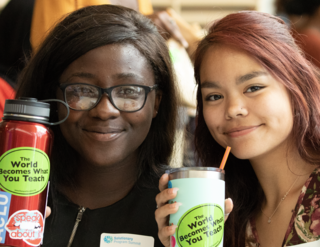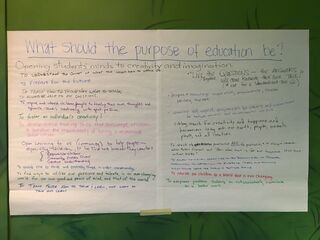Education
The Purpose of School Must Change
A Personal Perspective: It’s time to educate a generation of "solutionaries."
Posted September 20, 2022 Reviewed by Vanessa Lancaster
There’s a lot of discussion and debate around schools and education. Among them are the pandemic’s impacts on students and teachers; educators leaving the profession in droves; depression and anxiety among kids; banned books and topics, coupled with polarized school communities and school boards, to name a few.

The most important question is not yet being adequately asked and addressed: What should the purpose of education be?
If we don’t ask and seek to answer this question, we won’t ensure that the educational system is relevant to our era, and schools won’t focus on what matters most to students and the future they will inherit and shape.
When I lead professional development workshops for teachers, I often ask participants to write down what they believe the purpose of education should be.
Here’s some of what some have written:

“To find ways to utilize our passions and talents in an ever-changing world for our own good and peace of mind and that of the world.”
“To teach people how to think and learn, not what to think and learn.”
“To teach youth to think critically and compassionately in the face of real-life challenges.”
“To foster empathy, promote critical thinking and collaborative problem-solving, and encourage youth empowerment to create a just, compassionate, sustainable global community for all living beings and the planet.”
None of these statements about the purpose of education reflect the current goal in the United States, which is “to promote student achievement and preparation for global competitiveness.”
While “preparing students for global competition” has been a buzzphrase for decades now, does it surprise you that this is the actual mission of the U.S. Department of Education?
When I first discovered this, I was shocked. I thought the concept of educating for global competitiveness was generated by politicians and the media, not educational leaders in charge of determining the mission of our education system.
Is this goal worthy of our children? I don't think so. In a globalized world in which our actions and choices impact other people, animals, and ecosystems across the globe; on a planet that’s warming catastrophically because of systems we’ve created and have the capacity to transform; within societies that are mired in disinformation and misinformation, with citizens endlessly at odds with one another, arguing rather than solving problems, isn’t it time to reconsider whether preparing students for global competitiveness is the best we can do for them?
Many educators like to use the phrase, “Teach with the end in mind.” Is global competitiveness what we see as the highest end for our children and our planet? What if the end–the mission of education–were instead to build a future where all life can thrive? With that end in mind, we would focus on giving our students the skills, dispositions, and knowledge necessary to identify and transform unjust, unsustainable, and inhumane systems. We would prepare them to be solutionaries.
Without the appropriate mission and goal for education, we will continue to teach using curricula often based on outdated concepts and approaches for today’s–and tomorrow’s–world. With the right mission and goal, however, we can construct teaching methods and materials that are relevant and essential for our times and our children’s futures.
We are not yet preparing students well for life and work in a technologically-changing, globalized world, nor for a future in which much of life on Earth faces dire threats. Despite our many and various critiques of education, we often miss some of the most crucial underlying issues and some of the most exciting opportunities for transformation.
For example:
It’s not just that many students are graduating from high school without the necessary skills in literacy, numeracy, and science; it’s that even if they were to graduate with exceptional skills, they would not by design or purpose be properly educated and prepared for today’s world and the important task of solving critical global problems.
It’s not just that many students drop out; it’s that often these students perceive school to be irrelevant and not worthwhile, and many students—even those who don’t drop out—are largely disengaged.
It’s not just an "achievement gap;" it’s an opportunity gap, and we continue to fail to address poverty and structural racism, which are the primary causes of that gap, and often use biased standards and often use biased standards and assessment tools to measure achievement. Simultaneously, we fail to identify and measure many other achievements that matter.
It’s not just that students aren’t performing up to par; it’s that standardized tests are often poor evaluation tools, unworthy of our students’ true needs, and often at odds with helping them gain many of the skills they require. Many public-school teachers are required to "teach to the test." They are rarely educated or prepared to teach about interconnected global issues and "solutionary" thinking skills that are so essential for their students and the world.
It’s not just that bullying is a problem in schools and that compassion and character are not adequately cultivated to ensure kindness and responsibility; it’s that our daily lives are inextricably connected through the global economy to institutionalized brutality, injustice, and environmental devastation and that we do not usually learn in school how to be kind and responsible in a far-reaching way in a world in which our everyday choices impact other people, animals, and ecosystems across the planet.
It’s not just that cheating is rampant in school; we have an outmoded system that tempts students to cheat. With facts at their fingertips, students must cultivate research, collaboration, critical systems, and strategic and creative thinking skills. These skills are most effectively taught and fostered in ways that are antithetical to cheating, and teachers need support for shifting their focus toward these skills and employing more relevant assessments that make cheating a non-issue.
It’s not just that many students are overly stressed by their packed schedules, their hours of homework, and their extracurricular obligations; it’s that they have little opportunity to connect their learning to the real world, develop and follow their passions, and contribute in ways that are truly meaningful and demonstrate real accomplishments.
It’s not just that so many schools aren’t succeeding at achieving their stated objectives; many of their stated objectives are no longer the right ones for today’s world.
For the sake of our children, their future, and the entire educational endeavor, it’s time to identify and adopt the right purpose for schooling and educate the "solutionary" generation. When we do this, many of the current problems we’re focused on will also be solved along the way. Educating young people to be "solutionaries" is a win for them, a win for our nation, and a win for the future of our world.




